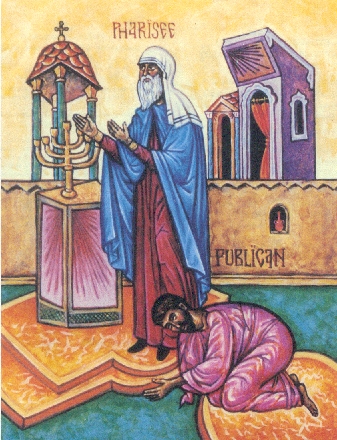SOURCE: St. Gregory of Palamas Outreach
In the name of the Father, and of the Son, and of the Holy Spirit.

The simple message in this parable is about our attitude toward God. What is the manner in which we conduct our lives? We see how each of these men conducts his life through his prayer. We are taught how to pray through this parable.
As it says in the Gospel, the Pharisee went to pray and prayed "thus with himself." THUS WITH HIMSELF. He was not praying to God; he was praying WITH HIMSELF. Why was his prayer with himself and not with God?
He is praying with himself because he is boastful and judgmental in his prayer: "I thank You God that I am not as other men …" The scripture reminds us, "Let a neighbor praise you, and not your own mouth: a stranger and not your own lips" (Proverbs 27:2).
The manner in which we pray is often reflective of the way in which we live our lives. We are all too often encouraged to be boastful in our lives. In business, we often get ahead by beating our own drum. We have all met these types of people that cannot stop telling us about the good things they have done. Our immediate reaction to these types of people is usually, "Will you shut up already?" Think about how it is for God if when we are in prayer all we do is tell Him about all the good things that we have done. It is most simply put in the Psalms: "put a door to your tongue, and a lock" (Psalms 140:3).
Not only is he boastful, but he is judgmental in his prayer. Judgment further ruins his prayer. As it says in Leviticus: "Of sheep, and ox, that is offered for sacrifice, there must be no blemish therein" (Leviticus 22:21). It further states in Isaiah: "This is not the fast that that I have chosen, says the Lord" (Isaiah 58:5). Thus, we are reminded that God only accepts pure gifts from those that are not boastful or proud.
Judgment will not only make our prayer unacceptable but will make us unacceptable to God. As it says in the Gospel of Saint Luke: "Judge not, and you shall not be judged: condemn not, and you shall not be condemned" (Luke 6:37). Saint James further confirms this in his epistle: "There is one Lawgiver, and Judge; why then judge your neighbor?" (James 4:12).
These are cautions for us about the manner in which we pray and live our lives.
In contrast to the Pharisee’s prayer, we are given the example of how we are to pray. First, we are to pray without ceasing (1 Thessalonians 5:17), as the Publican continually said, "God be merciful me a sinner." The last half of the Jesus prayer, "Lord Jesus Christ, Son of God, have mercy upon me a sinner," is based on this prayer.
The Publican further teaches us that we must not only pray continually but that we must first acknowledge our sin. This confirms what is said by the prophet Isaiah: "Declare your sins first, that you may be justified" (Isaiah 43:26). Thus, we learn through the Publican what is said in Proverbs: "The righteous is the accuser of himself" (Proverbs 18:17), and in Psalms: "I will confess against myself my transgression unto the Lord; and You forgave the iniquity of my heart" (Psalms 31:5). It is no coincidence that the Church tells us to begin all prayer with saying "God cleanse me a sinner and have mercy upon me" three times before we start any public or private prayer.
The Publican teaches us that by first being humble we can grow closer to God. It is only after we acknowledge how we have separated ourselves from God that we can come to God and praise Him properly and give thanks for the many blessings He has bestowed upon us. By recognizing our separation from God first, it is hard for us to fall into the traps of the Pharisee.
So, my dear brothers and sisters in Christ, I pray that each of you may not pray with yourselves, but that you may approach God as the Publican, recognizing your separation from Him, so that you may praise Him properly and give thanks to Him for all your blessings with a right mind.
Amen.
